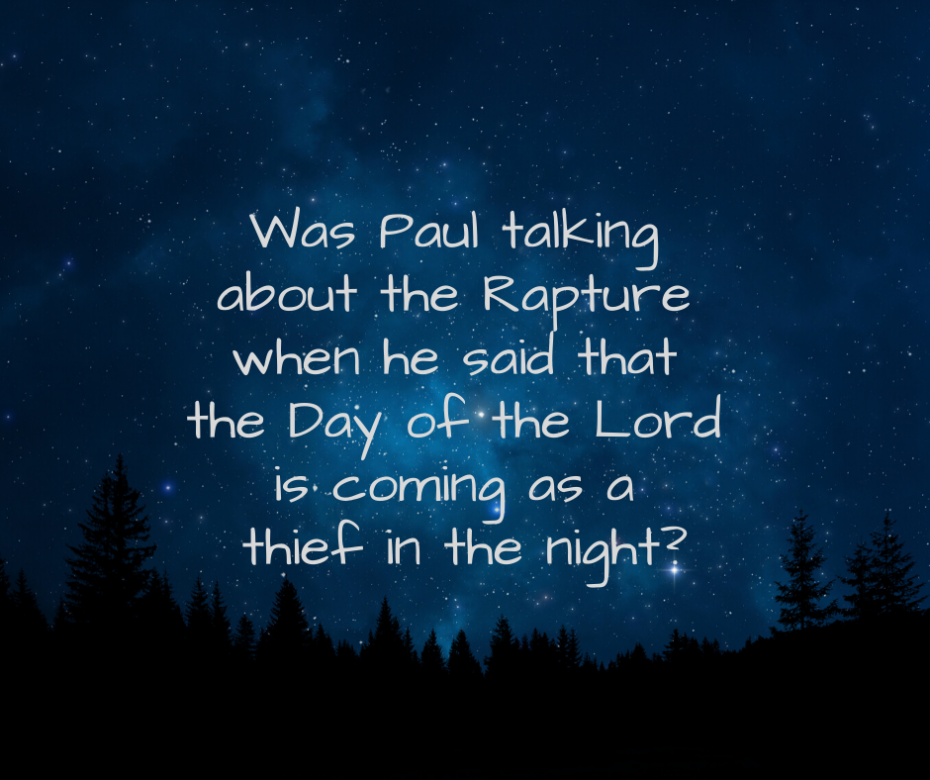For you yourselves know perfectly that the day of the Lord so comes as a thief in the night.
Like a Thief in the Night
This expression only occurs three times in the NT: Matt 24:43; 1 Thess 5:2; and 2 Pet 3:10.
Paul and Peter received this expression from the Lord’s teaching in the Sermon on the Mount (Matt 24:43). Moffatt in The Expositor’s Greek Testament commentary on 1-2 Thessalonians says regarding 1 Thess 5:2 that the words you know “refer to the teachings of Jesus on this crucial point, which Paul had transmitted to them” (p. 38; see also p. 8).
A thief does not announce when he will be coming. The Lord was saying that the start of His return would be without warning. That is, there will be no signs of the Rapture.
The Day of the Lord Starts with the Rapture
Peter uses the expression the Day of the Lord to refer to the entire time from the Rapture to the end of the Millennium (2 Pet 3:10).
The Day of the Lord can focus on the end of the Tribulation when there will be cosmic signs of the Lord’s Second Coming (Acts 2:20).
So, what does it mean in 1 Thess 5:2? There are three options. It refers to:
- the Rapture,
- the Tribulation, or
- the Rapture and the Tribulation.
If we conclude that 1 Thess 5:2 is derived from Matt 24:40-44, then we are left to decide if Matt 24:40-41 refers to the Rapture.
If Matt 24:40-44 refers to the Rapture as coming like a thief in the night, that suggests that 1 Thess 5:2 refers to the Rapture as well. The Lord said, “Then two men will be in the field: one will be taken and the other left. Two women will be grinding at the mill: one will be taken and the other left.” Are the ones taken up to meet the Lord in the Rapture, and the ones left must go into the Tribulation, or are the ones taken a reference to unbelievers who are removed from the earth after the Tribulation, and the ones left are believers who get to remain on earth and go into the Millennium?
Most Dispensationalists don’t see Matthew 24 as referring to the Rapture.
Dr. John Hart made a super case for the Rapture being in Matthew 24 in three articles in our Journal in 2007 and 2008. See JOTGES, Autumn 2007 (pp. 47-70), Spring 2008 (45-63), and Autumn 2008 (pp. 43-64).
Dr. John Walvoord has an excellent suggestion regarding the Day of the Lord in 1 Thess 5:2. He believes that it refers both to the end of the church age and to the beginning of the Day of the Lord:
The Day of the Lord will come suddenly and unexpectedly. What is the point? The point is that just as the translation of the church is the end of the day of grace it also marks the beginning of the Day of the Lord. In other words, the one event seems to do two things: it serves as the closing of one day and the beginning of the other…In 1 Thessalonians 5 it is revealed that the Day of the Lord comes suddenly and unexpectedly…It is described: “the day of the Lord so cometh as a thief in the night.” A thief in the night comes unheralded. There are no signs that pertain to a thief (The Thessalonian Epistles, p. 52).
In other words, he does see the day of the Lord in 1 Thess 5:2 as referring to the Rapture. He also sees it as referring to the start of the Tribulation. He takes the third view listed above. I do too.
I hope you will be a Berean and search the Scriptures to see whether the Day of the Lord in 1 Thess 5:2 refers to the Rapture or not.
Why is this important? The reason is simple. In 1 Thess 5:6, 10, Paul urges the believers in Thessalonica to be watchful, not morally asleep. If a believer begins to think that the Lord is not coming back to Rapture him at any moment, he is likely to experience moral failure (cf. Matt 24:45-51). We ought to be ever vigilant that the Rapture could occur at any moment. That vigilance is a strong aid in living wholeheartedly for our Lord and Savior and soon returning Judge.


